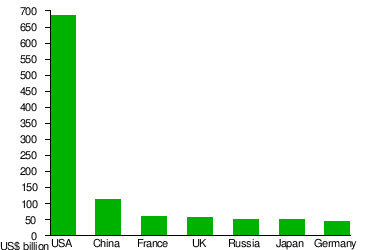The following graph is from http://en.wikipedia.org/wiki/List_of_co ... penditures:

The world's top 7 largest military budgets in 2010
From the same Wikipedia article, if one takes the per-country spending and adds it up, one finds the USA spends more money on its military than the next 19 countries combined - most of whom can be considered either neutral (I'm including countries like Brazil, India, etc., in the neutral bucket) or friends (UK, Japan, Germany, Italy, Canada, etc.). The two countries least aligned with U.S. interests in the top 20, Russia and China, combined spend less than one fourth what the U.S. spends.
Given this, what are people's thoughts on U.S. military expenditures in light of our current fiscal situation? For folks who would change spending (in either direction), what would you cut and/or spend more on?


